
I would be far from the first to observe the retro chic aesthetic now apparent in the last few years — from the 3D pixelated look of 3D Dot Heroes and Minecraft to the shimmering old CRT glow of Geometry Wars. Last I checked, there was even a new Tron out. What happened, exactly? It’s like my formative years have come back to ruin my eyesight all over again.
Zeit² represents the best parts of that nostalgic ’80s gimmick, in that, like Geometry Wars, it enhances everything that you remember about it. The graphics are crisp and pop. The animation effects look fluidly electric, controls are sensitive without getting touchy on you, and the music is classic looped MIDI sequence gold. (Or eerie Macintosh silver-blue, as the case may be. That seems to be in right now.). It looks and plays like you wished ’80s arcade side-scrolling shoot-’em-ups looked and played.
As for the game’s particular twist on the mechanics of the era, I hate to spoil it for you, but “zeit” is German for “time”. As in English, “zeit” can mean specific, every day time but also more nebulously an arc of experience or an era, as in “zeitgeist” or “the spirit of the times”. This speaks once again on the work as a kind of resurrection of a past generation, while also multiplying and complicating it — that is, squaring it. In Zeit², the convention is not so much that you reverse time but that you are able to enact two timelines simultaneously, which feed off of each other in order to advance toward a singular but often highly complex goal.
This might sound like developer Brightside Games just took all the fun out of a side-scroller and replaced it with math, but while Zeit² is no doubt leaning toward the cerebral side and will get you thinking tactically more than you may be used to, it’s actually quite intuitive. Controls are restricted to a fairly limited range of functions, and for as needlessly complex as the tutorial makes everything appear, there isn’t much that you can’t pick up from a first shakedown run. The temporal functions, assigned to the left and right triggers, are as twitchy as the clock is forgiving, affording as much experimentation as you might need. Nevertheless, you only have a few seconds worth of time to rewind, and these scant seconds do nothing to undo any damage you might have incurred. Thus, the genius of these time reversals is rather that you leave behind an echo of yourself, distracting enemies and doubling up damage as you interact with your own shadow.
If at this point you are asking if this is essentially Braid for space shooters, you wouldn’t be alone. The comparison between the two games has been drawn early and often, which — if nothing else — should lead us to consider that we might in fact be living now in a post-Braid discourse in which no independent game can manage to crawl out of its shadow for more than five minutes before being dragged back into it. While the time mechanics are no doubt similar, I would argue that in application Zeit² uses them to drastically different ends then does Jonathan Blow’s 2008 Braid. The latter rewards contemplation — even meditation — in metaphorically unraveling time as a construct on multiple levels. There is no room for contemplation in Zeit². You are forced to think quickly at all times, even while in reverse.
The quarter devouring arcade difficulty of the levels are belied by the game’s chapter feature, which allows you to pick up from an earlier checkpoint if you happen to die. The purist in me tried sticking it out and going back to the first stage every time until impatience (and deadlines) set in, for really there is little that the checkpoints add except the illusion of convenience. Like any good side-scroller, there’s a careful rhythm to the stages that is ruined if you launch into it midstream. This, together with the corny and superfluous “hints” during loading screens constitute my two biggest complaints about the game’s Xbox release, which on the whole should be regarded as fairly minor. It’s also a little, erm, short, but your thumbs won’t think so.
As with its many retro-styled contemporaries, Zeit² recalls a simpler era but mediates the past by (quite literally in this case) weaponizing it, providing a twist on the genre that’s rewardingly modern. Groundbreaking it is not, but as a pleasing time suck with gorgeous aesthetics, it’s hard to dislike.

